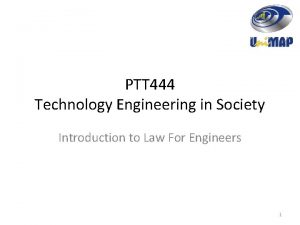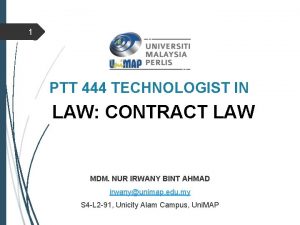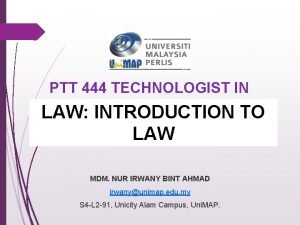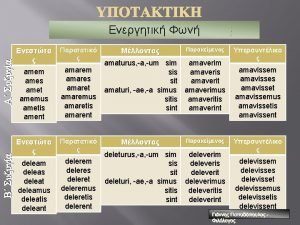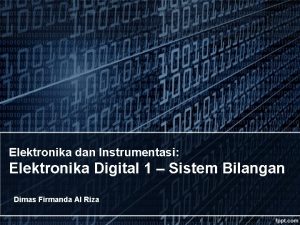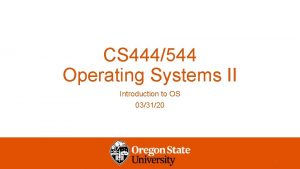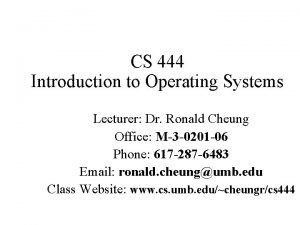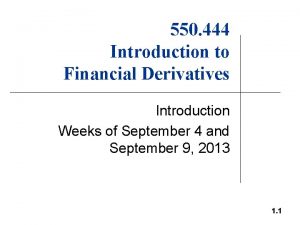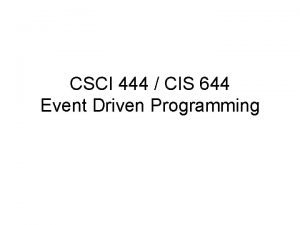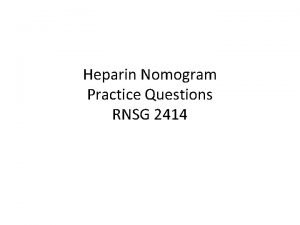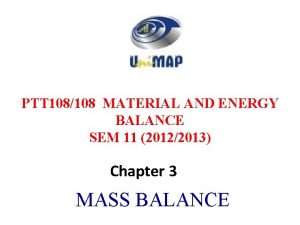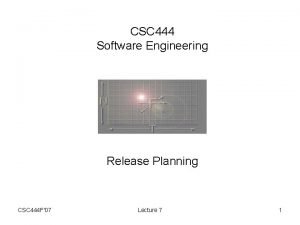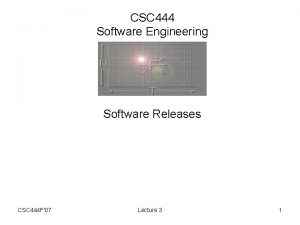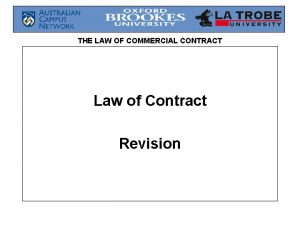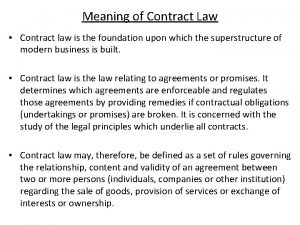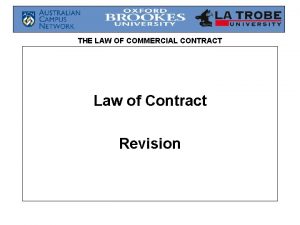1 PTT 444 TECHNOLOGIST IN SOCIETY LAW CONTRACT















![16 Decided Case CASE HARVEY VS. FACEY[1893]A. C. 552 A send a telegraph to 16 Decided Case CASE HARVEY VS. FACEY[1893]A. C. 552 A send a telegraph to](https://slidetodoc.com/presentation_image/3e3b6ae31264aa51faae127535b6e0e8/image-16.jpg)












![29 CASE : IGNATIUS V. BELL [1913]2 F. M. S. L. R. 115. “Court 29 CASE : IGNATIUS V. BELL [1913]2 F. M. S. L. R. 115. “Court](https://slidetodoc.com/presentation_image/3e3b6ae31264aa51faae127535b6e0e8/image-29.jpg)





























![59 Asia Commercial Finance (M) Bhd. v Yap Bee Lee & Ors. [1991] 1 59 Asia Commercial Finance (M) Bhd. v Yap Bee Lee & Ors. [1991] 1](https://slidetodoc.com/presentation_image/3e3b6ae31264aa51faae127535b6e0e8/image-59.jpg)























- Slides: 82

1 PTT 444 TECHNOLOGIST IN SOCIETY LAW: CONTRACT LAW MDM. NUR IRWANY BINT AHMAD irwany@unimap. edu. my S 4 -L 2 -91, Unicity Alam Campus, Uni. MAP

2 1. 0 CONTRACT LAW DEFINITION 1. 1 Books 1. 2 Decided Cases 2. 0 CONCEPT 2. 1 Freedom 2. 2 Certainty Of Contract 3. 0 Types Of Contract 3. 1 Unilateral 3. 2 Bilateral

3 4. 0 ELEMENT OF CONTRACT 4. 1 Offer 4. 2 Acceptance 4. 3 Consideration 4. 4 Intention to create legal relation 4. 5 Capacity 4. 6 Freedom Of Contract 4. 7 Certainty of contract 5. 0 TERMS OF CONTRACT 5. 1 Express 5. 2 Implied

4 6. 0 DISCHARGE OF CONTRACT 6. 1 Performance 6. 2 Breach Of Contract 6. 3 Agreement 6. 4 Doctrine of Frustration 7. 0 REMEDY 7. 1 Damages 7. 2 Specific Performance 7. 3 Injunction

5 LAW OF CONTRACT

6 1. 0 INTRODUCTION Contract law = foundation of all commercial activities May be in writing, by word of mouth (orally) by conduct, or by any combination of such.

7 DEFINITION • The word Contract in a legal sense refers to an agreement between two or more parties that is legally binding between them • Contract defined as an agreement enforceable by the law • A contract is an agreement between 2 or more parties which is enforceable at law.

8 LEGAL DEFINITION • CONTRACT 1951 i. Section 2(a) “When one person signifies to another his willingness to do or to abstain from doing anything, with a view to obtaining the assent of that other such act or abstinence he is said to make a proposal. ” ii. Section 10(1) parties competent to contract, for a lawful consideration and with a lawful object, and are not hereby expressly declared to be void. ”

9 2. 0 CONCEPT General principle: Freedom of contract – Everyone is free to enter into any contract - Without any pressure - Free to decide the terms of contract

10 3. 0 TYPE OF CONTRACT UNILATER AL Calil v. Carbolic Smokeball BILATERAL

11 4. 0 ELEMENTS OF CONTRACT

12 OFFER CERTAINTY OF CONTRACT ACCEPTANCE CONTRACT FREEDOM CAPACITY CONSIDERATIO N INTENTION TO CREATE LEGAL RELATION

1 OFFER 13

14 Definition • An agreement between two or more parties is constitued by a proposal. • An offer or proposal is necessary is for the formation of an agreement • Section 2(a) provides: “When a person signifies to another his willingness to do or to abstain from doing anything with a view to obtaining the assent of that other to the act or abstinence, he is said to make a proposal. ”

15 Example Ali want to sell his car. He make an offer to Rahim his car for RM 25, 00. If Rahim say yes, the offer is said to be accepted. When the Offer has been made it become promise. A person who make an offer is now referred as promisor and the party accepting the proposal as promisee.
![16 Decided Case CASE HARVEY VS FACEY1893A C 552 A send a telegraph to 16 Decided Case CASE HARVEY VS. FACEY[1893]A. C. 552 A send a telegraph to](https://slidetodoc.com/presentation_image/3e3b6ae31264aa51faae127535b6e0e8/image-16.jpg)
16 Decided Case CASE HARVEY VS. FACEY[1893]A. C. 552 A send a telegraph to B saying that "Can You sell to us Bumper Hall Pen Hall? Answer for the lowest cash price by telegraph. B replied by telegraph" the lowest price for Bumper Hall Pen is 900 pounds. A send telegraph, we agree to buy Bumper Hall Pen at 900 pounds, as requested by you. A claim that this telegraph exchange was a valid offer and acceptance Privy Council decided that a statement of fact which has been made only to provide information should not be construed as an offer.

17 TYPES OF OFFER SPECIFIC OFFER GENERAL OFFER - The Offer only can be accepted by a person who been offer - Offer is general as it is made to the public - Case Boulton v. Jones - Case Carlill Carbolic Smokeball Co.

18 Boulton vs. Jones(1857) 2 H & N 564 Defendant have a transaction with a dealer named Brocklehurst. It was an order to buy goods to Brocklehurst, but on the day the order is sent, Brocklehurst has already sold his company to the Plaintiff then send the ordered goods without notifying the Defendant have transfer the ownership of the company. Defendant refused to pay. Court decided that the Plaintiff is not entitled to receive an offer that is not directed to him.

19 Carlil vs. Carbolic Smoke Ball Co. [189 QB 256 The Defendants advertised that they would offer a sum of money to anyone who would offer still succumb to influenza after using a certain product according to the instructions for a fixed period. The Plaintiff duly used the product advertised but, nevertheless, became ill. The Plaintiff , upon refusal of the Defendants to honors their promise, proceed to sue them. The Court Of Appeal held that the Plaintiff had accepted the offer of the company made to the world at large and is, thefore, entitled to the money.

20 ELEMENTS OF OFFER CERTAINTY OF OFFER - The offer must be firm - There must be a definite intention to adhere to the offer. COMMUNICATION TO OFFER - Complete when it comes to the knowledge of the person to whom it is made by virtue of section 4. - Case R v Clarke ( 1927) 40 CLR 227 – Western Australian government offered a reward for capturing some murderers, Clarke was an accomplice, saw the advertisement but never addressed his mind to it and informed the government held: no reward to Clark

21 TERMINATION OF OFFER 1. By acceptance 2. By rejection – a counter-offer is a rejection ; a request for information is not a rejection 3. By revocation at anytime before acceptance ( Routledge v Grant (1828) 130 ER 920) 4. By lapse of reasonable time 5. By death of the offeror & Of the offeree. * After termination, the offer is no longer a valid offer and cannot be accepted.

22 Invitation To Treat An offer should be contrasted with an option and an advertisement. An option is merely an undertaking to keep the offer open for a certain period of time. Advertisement is an attempt to induce offer.

23 ITT Advertisement Booking Form Display Of Good Tenders

2 ACCEPTANCE 24

25 ACCEPTANCE When the person to whom the proposal is made signifies his assent thereto, the proposal is said to be accepted. When it’s comes into existence after the offeree unconditionally accepts the offer. A proposal when accepted, become a promise. When 1 party introduces variations/conditions to the terms of the latest proposal, there is no acceptance. Such variations/conditions amount to a counter proposal/offer. No agreement. Sec. 2(b) Contract Act 1950 say that: “ when the person to whom the proposal is made signifies his assent thereto, the proposal is said to be accepted: a proposal, when accepted, becomes a promise; ”

26 ELEMENTS OF ACCEPTANCE 1. The acceptance of that proposal must be absolute and unqualified by virtue of section 7(a). CASE : HYDE V. WRENCH [1840] 3 Beav. 344 ER 132 The Def. offered to sell his estate to the Pl. on 6 Jun for 100 pound. On 8 June, in reply, the Pl. made a counter proposal to purchase at 950 pound. When the Def. refused to accept this offer on 27 June, the Pl. wrote again that he was prepared to pay the original sum demanded. The Court held that no contracted existed between them. The Pl. had rejected the original proposal on 8 June so that he was no longer capable of accepting it later.

27 ELEMENTS OF ACCEPTANCE 3. Acceptance must be expressed is some usual and reasonable manner, unless the proposer prescribe the manner in which it is to be accepted under section 7(b). Sec. 7(b) “ In oder to convert a proposal into a promise the acceptance must- (b) be expressed in some usual and reasonable manner, unless the proposal prescribes the manner in which it is to be accepted. If the proposal prescribes the manner in which it is to be accepted, and the acceptance is not made in that manner, the proposal may within a reasonable time after the acceptance is comunicated to him, insist that his proposal shall be accepted in the prescribed manner, and not otherwise; but, if he fails to do so, he accepts the acceptance. ”

28 1. COMMUNICATION OF ACCEPTANCE Acceptance is only effective when it has been communicated. It’s can be made by word or mouth, letter, telex, facsimile or recorded message. 2. In England, the communication of acceptance is complete upon posting. 3. In Malaysia the Contract Act stipulates different times when the communication of an acceptance is complete. - Section 4(2)(a) To Offeror when it is put in a course of transmission to - Section 4(2)(b) To Offeree when it comes to the knowledge of the him. Offeror.
![29 CASE IGNATIUS V BELL 19132 F M S L R 115 Court 29 CASE : IGNATIUS V. BELL [1913]2 F. M. S. L. R. 115. “Court](https://slidetodoc.com/presentation_image/3e3b6ae31264aa51faae127535b6e0e8/image-29.jpg)
29 CASE : IGNATIUS V. BELL [1913]2 F. M. S. L. R. 115. “Court held that there can still be an agreement because the Offeror, though having no knowledge of the acceptance, is bound whilst the acceptor, because his acceptance had not come to the knowledge of the proposer, is not bound. ”

30 REVOCATION OF OFFER AND ACCEPTANCE 1. Section 5(1) provide that a proposal may be revoked at any time before the communication of its acceptance is complete as against the proposer, but not afterwards. 2. A proposal may be withdrawn in any of the following circumstances: 2. 1. Communicating the notice of revocation by the proposer to the party to whom the proposal was made under section 6(a). 2. 2. The time prescribed in the proposal for its acceptances elapses, or if no time is prescribed for acceptance, by the lapse of a reasonable time under section 6(b)

31 REVOCATION OF OFFER AND ACCEPTANCE 2. 3. The failure of the acceptor to fulfill a condition precedent to acceptance under section 6(c ) 2. 4. The Death or mental disorder come to the knowledge of the acceptor before acceptance under section 6(d)

32 COMMUNICATION OF REVOCATION 1. Complete as against the person who makes the revocation when it is put in the course of transmission to the person to whom it is made by virtue of section 4(3)(b) 2. Completed as against whom it is made only when it comes to his knowledge by virtue of section 4(3)(b)

3 33 CONSIDERATION

34 DEFINATION 1. Consideration is what distinguishes a bargain or contract form gift. 2. Section 26, the general rule in a contract is that an agreement without consideration is void. 3. Section 2(d) defined the word consideration is when at the desire of the promisor, the promisee or any other person has done or abstained from doing, or does or abstains from doing, or promises to do or abstains from doing, something, such act or abstinence or promise is called a consideration for the promise.

35 DEFINATION Something of value in the eyes of the law (need not be of market value). Hence, the saying : ”Consideration must be sufficient but not adequate. ” Price to be paid for the promise. May consists of money, goods, promise, suffering some detriment (e. g. forbearance to sue) Consideration must flow from the propose in respect of any promise.

36 TYPES OF CONSIDERATION 1. Past Consideration 2. Executed Consideration 3. Executory Consideration

37 TYPES OF CONSIDERATION 1. Past Consideration - Something wholly performed before the promise was made. - Under the English Law past consideration is not consideration. gooda However Malaysia, in. Past Consideration is a good consideration.

38 TYPES OF CONSIDERATION 2. Executed Consideration - An act which has been done to fulfill the contract. 3. Executory Consideration - An act or promise that will be done in future

4 INTENTION TO CREATE 39 LEGAL RELATIONS

40 1. All contract is an agreement and not all agreement is contract. 2. Intention is the most important element which will change an agreement to contract. 3. Although the Contract Act is silent on the intention to create legal relations as one of the requirements of a valid contract, case law clearly dictates the necessity of this requirement. 4. Both parties must intend that the agreement is to be binding on them (i. e. they have agreed to bear the duties under the contract). Objective test : reasonable man’s test

COURT PRESUMPTION 41 1. No legal intention i. Family Agreement (Domestic) Case Balfour v. Balfour A married couple who live in Sri Lanka returned to England for avacation. The husband later returned to work in Sri Lanka, but thewife stayed back in England on doctorÊs advice. He promised her £ 30 a month until he returned. Later, he wrote to the wife saying that it would be better if they remained apart. The wife sued him on the promise to pay her £ 30 a month. The Court of Appeal held that the arrangements made between husband wife was not a contract attended by legal consequences. The presumption that there was no intention to contract was not rebutted by the wife, Mrs. Balfour. Therefore, they were presumed to have no intention to contract. 2. LEGAL INTENTION i. All Commercial arrangement is Contract

5 CAPACITY 42

43 CAPACITY 1. The parties entering into a contract should be competent to contract according to the law which is subject, and of sound mind. 2. In principle, every person is qualified to contract. The question is who is competent to contract?

44 Sec. 11 Contract 1950 Every person is competent to contract who is of the age of majority according to the law to which he is subject, and who is of sound mind and is not disqualified from contracting by any law which he is subject.

45 According to S. 11, a person who has not reached the age of majority is not competent to contract a) Contract by a Minor Except for S. 10, the Contracts Act does not explain the effects of a contract made by a minor. S. 10 states „all agreements are contracts if they are made by parties competent to contract. In short, every agreement made by a minor is, by S. 11 of the Contracts Act 1950, not a contract

46 Capacity as to Age According to the Age of Majority Act 1971, for every individual person, the age of majority is 18 years old.

47 Contract By Minor 1. Every Agreements made by a minor is not a contract – Sec 11. 2. For example – Ahmad, who is 13 years old, enters an electrical goods shop and purchase, on installment, a television set from Brahim. When Ahmad fails to pay the installment, Brahim sues Ahmad for breach of contract.

48 Mohori Bibee v Dharmodas Ghose The Appellant in this case loan a sum of money to the respondent, who is a minor, secured on a house which was leased to the appellant. The minor through his mother applied for a court declaration that the lease was void because the minor had no capacity to contract. According to sec. 9 and sec. 10 of the Indian Contract act, which is in pari materia to Sec. 10 and Sec. 11 of The Malaysian Contract Act, a Contract by a minor was void. The Contract with the minor was void and he could not sue or be sued on any contract

49 1. CAPACITY Case Tah Hee Juan v. Teh Boon Keat Case; Tranfer Land by a minor…. Hereford J. said the contract is void.

50 EXCEPTION 1. There is a few exception for this element which has been given by Contract Act 1971. 2. Section 69 “ If a person, incapable of entering into a contract, or any one whom he is legally bound to support, is supplied by another person with necessaries suited to his condition in life, the person who has furnished such supplies is entitled to be reimbursed from the property of such incapable person”

51 EXCEPTION Contract By A Minor Under Age Of Majority Act 1971 An Act allowed under any law. Contract For Necessary

52 NECESSARY FOR MINOR 1. Contract Act 1971 did not defined the service that necessary for minor’s life. 2. Common Law give us the necessary thing for minor’s life; 2. 1. Cloth 2. 2. Medical Treatment 2. 3. House 2. 4. Food 2. 5. Education 2. 6. Professional Training 2. 7. Scholarship 2. 8. Insurance

53 Age Of Majority Act 1. Marriage, Divorce, dowries and child adoption. Rajeshwary Anor v Balakrishnan Ors. 2. Religion an religious practices and ceremonies of the races in Malaysia. 3. Case Rajeswary v. Balakrishnan Court held that when defendant broke his promise of marriage with plaintiff, the defendant was according to their religious practice, in breach of his contract of marriage, even plaintiff was a minor.

54 An Act Under Any Law 1. Election Act– 21 years old. 2. The Employment Act 1955 – 14 years old 3. Contract (Amendment) Act 1976 – Scholarship 4. Insurance Act 1996 – 10 years old(with consent )

55 Sound Mind vs. Unsound Mind

56 Mental Capacity A contract is formed pursuant to consensus of minds on a matter. What is the significance of soundness of mind? What is unsound mind? Unsoundness of mind which causes incapacity to contract covers usual unsoundness of mind and occasional unsoundness of mind.

57 Section 12 1. A person who sound of mind can make a contract if at the time when he makes it, he is capable of understanding it and of forming a rational judgment as to its effect upon his interest. 2. A person who is usually of unsound mind, but occasionally of sound mind, may make a contract when he is of sound mind. 3. A person who is usually of sound mind, but occasionally of unsound mind, may not make a contract when he is of unsound mind.

58 According to English Law, a contract made by a person of unsound mind is not void contract but voidable at the option of the party who is of unsound mind.
![59 Asia Commercial Finance M Bhd v Yap Bee Lee Ors 1991 1 59 Asia Commercial Finance (M) Bhd. v Yap Bee Lee & Ors. [1991] 1](https://slidetodoc.com/presentation_image/3e3b6ae31264aa51faae127535b6e0e8/image-59.jpg)
59 Asia Commercial Finance (M) Bhd. v Yap Bee Lee & Ors. [1991] 1 CLJ 271 The court stated that a person of sound mind who intended to rescind a contract which he had entered into, on the grounds of unsoundness of mind must prove two things, that is he was of unsound mind and the fact of the unsoundness of his mind was known to the other party at the time of entering into the contract.

6 FREEDOM 60

61 FREEDOM IN CONTRACT 1. Parties should entered any contract freely without any pressure from other parties. 2. S. 10 states that every agreement is a contract if it is made by the free consent of the parties. 3. On that basis, every contract must be voluntarily done without any negative element which affects a person’s capacity to make independent decisions. 4. Independent decisions are decisions which are made after due consideration of the effects of a contract on the person.

62 FREEDOM IN CONTRACT 1. Parties should entered any contract freely without any coercion from other parties. 2. Section 14 Contract Act 1950 stated that any parties who entered any contract consider freely if they entered it without : 2. 1. Coercion – Sec. 15 (Sec. 19 – A contract made under coercion is a valid contract, but voidable contract. ) 2. 2. Undue Influence – Sec. 16 2. 3. Fraud – Sec. 17 2. 4. Misrepresentation – Sec. 18

7 CERTAINTY OF CONTRACT 63

64 CERTAINTY OF CONTRACT 1. Any contract should be legal 2. The terms of a contract must be certain and not vague. 3. Any Agreements which is not certain or capable of being made certain, are void under sec. 30 “ Agreement, the meaning of which is not certain, or capable of being made certain, are void. ”

65 CERTAINTY Every term of an agreement must be certain or capable of being ascertained. Where the terms of an agreement are not certain, the contract may be void. This is stated in S. 30 CA 1950. For explanation, please refer to llustrations (a), (c), (d) and (f) to S. 30.

66 Karuppan Chetty v Suah Thian The court in this case held that the agreement of the parties in a contract for lease of land for $35 a month for „so long as the lessee pleases is a void contract for lack of certainty of terms. SELF-CHECK 1. 5

67 5. 0 TERMS AND CONDITION

68 5. 0 TERMS OF CONTRACT 1. It is essential requirement for a contract to be legally binding that the parties have reached the agreement. 2. This term of agreement which they have set out, in writing and partly verbally. 3. These terms of the agreement which they have set out, in writing, verbally or a mixture of the two are known as express terms.

69 1. TERMS OF CONTRACT These terms has been divided into to types; i. Express Terms - Terms that are expressed agreed by the parties orally, in writing or partly orally, party in writing. ii. Implied Terms - Terms that work on the presumed intention of the parties to give effect to the business efficacies of the contract. 2. The express and implied terms are divided to conditions and warranties. 3. Condition are stipulations essential to the main purpose of the contract. If there any breach of condition, the injured party may only claim for damages

70 3. TERMS OF CONTRACT Condition are stipulations essential to the main purpose of the contract. If there any breach of condition, the injured party may only claim for damages

71 6. 0 DISCHARGE OF CONTRACT

72 6. 0 DISCHARGE OF CONTRACT 1. Discharge of contract is an example way for the parties to separated from the agreement. 2. There are four ways to discharge; DISCHARGE OF CONTRACT PERFORMANC E BREACH AGREEMENT FRUSTRATION

73 PERFORMANCE A contract may be discharged by full performance. The contract in Case Cutter v Powell is regarded as a “whole” contract and must be performed in full.

74 AGREEMENT 1. When there is a new agreement between parties. 2. The new agreement abolish the old agreement.

75 BREACH 1. No performance by the contracted time, place and conditions. 2. A party express its intention not to perform. 3. A party acts in such a way as to sow its intention not to perform.

76 FRUSTRATION Sec. 57(1) – any agreement impossible to proceed is void.

77 FRUSTRATION 1. Without fault of either party. - A contractual obligation has become incapable of being performed because circumstances in which performance is called for would render it a thing radically different from that which was undertaken. . ” per Lord Radcliffe in D avis Contractors v Fareham U D C [1956] ACC 696 2. Extraneous change of circumstances which makes performance impossible Effect: Both parties need not perform – contract discharge 3. Subject matter destroyed - T aylor v Cald w ell (1863) 3 B & S 826 – Hall destroyed by fire – contract discharged.

78 FRUSTRATION 4. Expected event does not occur : Coronation cases : Kr. Vell v Henry [1903] 2 KB 740: King George VI sicked – rented premises not served its purpose – contract discharged. 5. Person to perform dies or falls ill: Robison v Davison (1871) LR Ex 269: performer sicked on performance day – contract discharged. 6. Change in law making it impossible to perform: Baily v Dee Crespigny (1869) LR 4 QBB 180: no blockade clause turns impossible because of change of law – contract discharged

79 FRUSTRATION 7. Change in law makes performance illegal. - Czarnik o Ltd v Rolimpe x [1979] AC 351: export of goods impossible because of change in law – discharged 8. Performance become radically different. - Wong Lai Ying v Chinachem [1980] HKLR 1: landslide stopped construction work for 3. 5 years – discharged.

80 7. 0 REMEDIES

81 7. 0 REMEDIES 1. If there is breach of contract has been made, other parties who suffered damage can take action to recovered his loss. 2. Breach of contract mean any parties who breach any terms in the agreement.

REMEDIES 82 DAMAGES Unliquidated damages Liquidated REMEDIES EKUITY Specific Performance Injunction
 Ptt 444
Ptt 444 Contract capacity
Contract capacity Jamil bin harun v yang kamsiah
Jamil bin harun v yang kamsiah 444 ptt
444 ptt Neurodiagnostic technologist programs near me
Neurodiagnostic technologist programs near me Venipuncture radiologic technologist
Venipuncture radiologic technologist Role of medical technologist
Role of medical technologist Oacett certification
Oacett certification Dennis food technologist
Dennis food technologist Chief technologist
Chief technologist Certified broadcast networking technologist
Certified broadcast networking technologist Contract assets and contract liabilities
Contract assets and contract liabilities Contingent contract and wagering contract
Contingent contract and wagering contract Newton's first law and second law and third law
Newton's first law and second law and third law Newton's first law and second law and third law
Newton's first law and second law and third law V=k/p
V=k/p Constant in avogadro's law
Constant in avogadro's law 444 5 lecke
444 5 lecke 555 666 888 33 88 artinya
555 666 888 33 88 artinya Cs 444 oregon state
Cs 444 oregon state Cs 444
Cs 444 550-444
550-444 Ciferny sucet cisla 444
Ciferny sucet cisla 444 Lied 444
Lied 444 Turkish education system 4+4+4
Turkish education system 4+4+4 0 444 fração geratriz
0 444 fração geratriz Piping system design
Piping system design -vertical
-vertical Pneumatic piping system design
Pneumatic piping system design Me 444
Me 444 N 444
N 444 444 outline
444 outline Kto uzem
Kto uzem Me 444
Me 444 Artaxerxes decree 444
Artaxerxes decree 444 Artaxerxes decree 457
Artaxerxes decree 457 Da form 3020-r
Da form 3020-r Dcccxci
Dcccxci Emsmdb
Emsmdb Gertler econ
Gertler econ Robert williams ptt
Robert williams ptt Von willebrand disease
Von willebrand disease Ptt test high
Ptt test high Ptt levels
Ptt levels Ptt taiwan drama
Ptt taiwan drama Smartptt enterprise
Smartptt enterprise Rtty qso example
Rtty qso example Ptt-350
Ptt-350 Ptt-350
Ptt-350 Ptt 304
Ptt 304 Angular ptt
Angular ptt Partial thromboplastin time
Partial thromboplastin time Ptt normal range
Ptt normal range One drive
One drive Kep adresi örneği
Kep adresi örneği Excel ptt
Excel ptt Ptt heparin
Ptt heparin Acele posta servisi takip
Acele posta servisi takip Pt vs ptt
Pt vs ptt Pt aptt
Pt aptt Fick ptt
Fick ptt Thurs ptt
Thurs ptt Thurs ptt
Thurs ptt Pttbbs
Pttbbs Pt vs ptt
Pt vs ptt Heat transfer in evaporator formula
Heat transfer in evaporator formula Dr toral patel
Dr toral patel Uso core worker process ptt
Uso core worker process ptt Https//threatmap.checkpoint.com
Https//threatmap.checkpoint.com Elisez ptt
Elisez ptt Bruno ptt
Bruno ptt Trust global ptt
Trust global ptt Ptt
Ptt Biotech ptt
Biotech ptt Stationary ptt
Stationary ptt Taiwan earthquake
Taiwan earthquake Tubitak imzager
Tubitak imzager Ptt aptitude test
Ptt aptitude test 206 ptt
206 ptt Johnny talk ptt
Johnny talk ptt Iridium ptt command center
Iridium ptt command center Ptt
Ptt Biotechnology
Biotechnology
